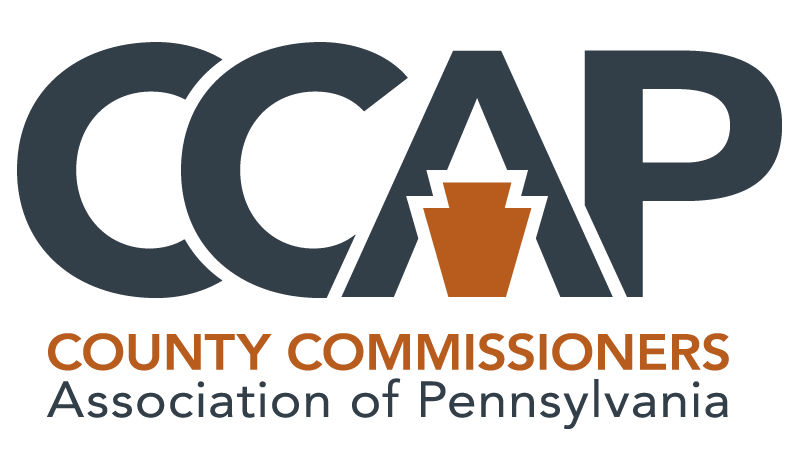The County Commissioners Association of Pennsylvania (CCAP) recently bestowed the 21st Century Best Practices Awards upon state Criminal Justice Systems.
The 2018 Best Practices Award in the large county jail category was presented to Lancaster County Prison for their PrisonStat Program, an active leadership strategy to achieve transparency, accountability, and efficiency at the prison, drive real measurable results, and help turnaround the organization. First initiated in 2016, the program Prison Stat is modeled on the Performance Stat idea which is an active leadership model that uses an ongoing series of regular meetings during which the chief executive and/or leadership team uses current data to analyze aspects of an organization’s performance. This continuing analysis of predetermined metrics produces results by pushing the organization toward performance targets. It also provides leaders with the ability to articulate to the organization and public what improved results need to be demonstrated. Each department head is assigned a metric pertaining to their job description, and are responsible for oversight of a specific area. They are held accountable during the public meeting scheduled every two months and their performance is transparent for the public to see whether positive or negative.
An Honorable Mention in the large jail category was awarded to Berks County Prison for their Mental Health First Aid (MHFA) Certification. With their rising mental health population, they recognized a need to improve staff training and education about signs and symptoms of mental illness, for all staff, especially custody supervisors and correctional officers. Custody staff are traditionally not trained in mental health awareness and on the whole tend to lack the information/education to understand and effectively respond to the specific needs of the mentally ill population. Mental Health First Aid USA is an 8-hour course that teaches a five-step action plan encompassing the skills, resources and knowledge to help an individual in crisis connect with appropriate professional, peer and self-help care. Participants learn the unique risk factors and warning signs of mental health problems, build understanding of the importance of early intervention and, most importantly, learn how to help someone in crisis or experiencing a mental health challenge. This approach is demonstrating results throughout the prison and better outcomes for both inmates and staff.
Snyder County is the recipient of the Best Practices Award in the small jail category for their Facility Dog Program. During the month of September 2014, the MHC completed 172 sick calls, more than any other provider. The psychiatrist completed the second highest amount of sick call by completing 35. This showed a prevalence of mental health within the facility and the need for the MHC to have a variety of tools to use when working with these patients. The majority of the individuals seeking mental health treatment at the Snyder County Prison reported struggling with anxiety and/or depression. While psychiatric medications can be used to treat depression and anxiety, it is not the first resource that is used. The Facility Dog Program at the Snyder County Prison was implemented on June 22, 2015 to help reduce anxiety and depression among inmate population. Studies have provided empirical evidence that animals are natural stress reducers. With the large percentage of the inmate population requesting assistance in managing their mental health symptoms, the majority of these individuals were receiving medications for relief of these symptoms prior to the implementation of the facility dog program. With the use of a facility dog, the MHC offers another tool before the use of medications that are often expensive, have undesired side effects, and are commonly abused. The decrease in the use of psychotropic medications would also be a direct correlation to the reduction in the amount of money spent on purchasing psychotropic medication, the amount of contraband (i.e., cheeking medication) found in the facility, and the amount of abuse/misuse of the medication by the inmate population.
The 2018 recipient of the Juvenile Alternatives Program Award is Lancaster County for their P.U.L.S.E. Evening Treatment Center. Lancaster County’s Juvenile Court, the Office of Juvenile Probation, and the Children and Youth Agency were experiencing a reduced accessibility to specialized programs, as well as the closure of some residential facilities. This resulted in their need to seek out opportunities to keep low to moderate risk juveniles within close proximity to home and community resources which could parallel the successful outcomes of long-term placements.
The Youth Intervention Center initially developed the P.U.L.S.E. Weekend Program with the objective of providing short-term, research/evidence based treatment with the goal of diverting juveniles away from the need for long-term placements. While the P.U.L.S.E. Weekend Program served a number of the needs of Lancaster County youth, it became evident that there were additional areas of need that were not being met with the current program. The P.U.L.S.E. Evening Treatment Center serves adolescents who are involved with the Office of Juvenile Probation or the Children and Youth Agency. The program is offered to males and females ages 13-18. It is open to adolescents who live in the community, as well as those who reside in the Youth Intervention Center Shelter Program. Participants will be transported to the program after school and then transported home at 8:30 p.m. as long as they live within a 12 mile radius of the facility. The participant’s goals, program length, and groups will be determined based on recommendations from the juvenile probation officer or children and youth caseworker, consultation with the parents/guardians, and results of various assessments. The participants participate in evidence based programs, as well as psycho-educational groups. The results are demonstrated in improved outcomes for juveniles and their families.
The Partner Award recipient is Carolyn McKenna, director of development at Home of the Sparrow in Chester County. Trauma histories, substance use, housing and self-sufficiency are among the challenges facing women’s successful reentry from incarceration in Chester County’s criminal justice system. In the face of this, justice-involved women provided with reentry services and supervision through the Chester County Women’s Reentry, Assessment and Programming Initiative (WRAP) have turned the tide, recidivating at lower rates and increasing compliance with community supervision. Partnering with the County Criminal Justice System, Home of the Sparrow provides case management services to women re-integrating into their communities following the Collaborative Casework-Women Model developed by the National Institute of Corrections. Challenged with increasing numbers of women involved with the criminal justice system, county leaders realized business as usual supervision and service provision was not working. The system needed to provide connections and interventions that respect the life experiences women bring with them to the system. Home of the Sparrow bravely stepped forward with a desire to provide services to this vulnerable, often underserved, population.
Having already committed to trauma-informed service delivery, Home of the Sparrow quickly engaged with the WRAP target population of women preparing for re-entry from Chester County Prison and those facing violations of their community supervision. Interventions focus on approaches that take into account women’s life circumstances and address basic needs, behavioral and physical health, employment, child welfare and housing. Referrals for case management are made for women who present with multiple needs and lack the skills or resources to meet those needs. Home of the Sparrow embraces the philosophy that case management for justice-involved women should be a dynamic, seamless process from entry into the system and continue until the woman is stabilized in her community with the goal of not only reducing criminal behavior but increasing the health and well-being of women, their families, and community. They provide a comprehensive case management model that addresses the complex and multiple needs of women involved with the justice system, recognizing that women have strengths that can be mobilized, while matching services in accordance with risk level and need.
Case managers have proven invaluable in building links within the community to promote appropriate service provision. As part of a multi-disciplinary case management team that includes probation staff, behavioral health and healthcare providers, Home of the Sparrow has assisted the local system in transforming the traditional criminal justice paradigm of control and compliance and a focus on presenting problems, to a model where problems are seen as trauma-driven coping mechanisms and supervision emphasizes collaboration and relationships, and self-defined goals focusing on recovery, self-efficacy, and healing.
The Criminal Justice Advisory Board (CJAB) Award winner for 2018 is the Potter County CJAB, which has identified three current priority issues in their strategic plan: alcohol and drug abuse, mental health and recidivism. The Potter County CJAB has been diligent in its efforts to create efficiencies that improve the administration of the criminal justice within the county. The Potter County DUI Treatment Court originated in September of 2013. To date this specialty court has saved approximately 10,000 jail days and graduated twenty-two participants from the program. Of those twenty-two, only three have re-offended with an alcohol/drug charge.
The program has had a total of thirty-one participants. In 2016 the Potter County DUI Treatment Court was accredited by the Administrative Office of Pennsylvania Courts (AOPC). In May of 2015, Potter County initiated their Drug Treatment Court. To date this specialty court has saved approximately 7,000 jail days and has graduated eleven participants from the program. The program has had a total of twenty-nine participants and of the twenty-nine, ten have been removed from the program. In November 2016, a grant secured through the Pennsylvania District Attorney’s Association supported “Prescription Drug Take Back” boxes at four locations in Potter County. These collection boxes have helped to stop prescription drug abuse by removing potentially addicting medications from homes that have the potential to be stolen and/or misused. During the first year of the program, 160 pounds of medications were collected locally.
Recently, Potter County CJAB began focusing their efforts on a new Pre-trial Services Program for which they received funding through CCAP. Their goals include assisting the courts in reviewing and amending the conditions of bail release and to provide supervision of defendants and assure compliance with conditions of release that have been set by the courts. The level of motivation and collaboration among the CJAB members and stakeholders is evidence that Potter County is committed to providing services to the citizens of the county that are efficient, effective and enhance public safety.
CCAP salutes everyone involved in these efforts for being innovative pioneers in meeting the challenges facing all county jails and juvenile justice providers.




